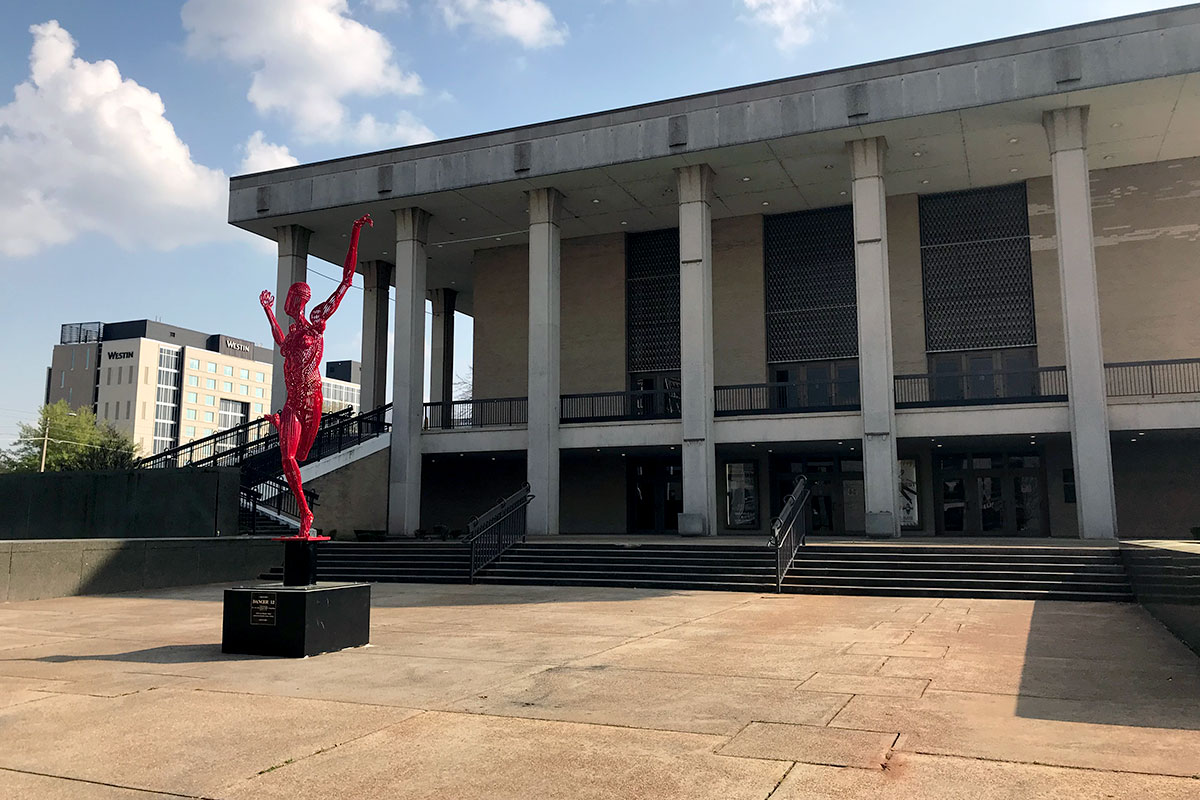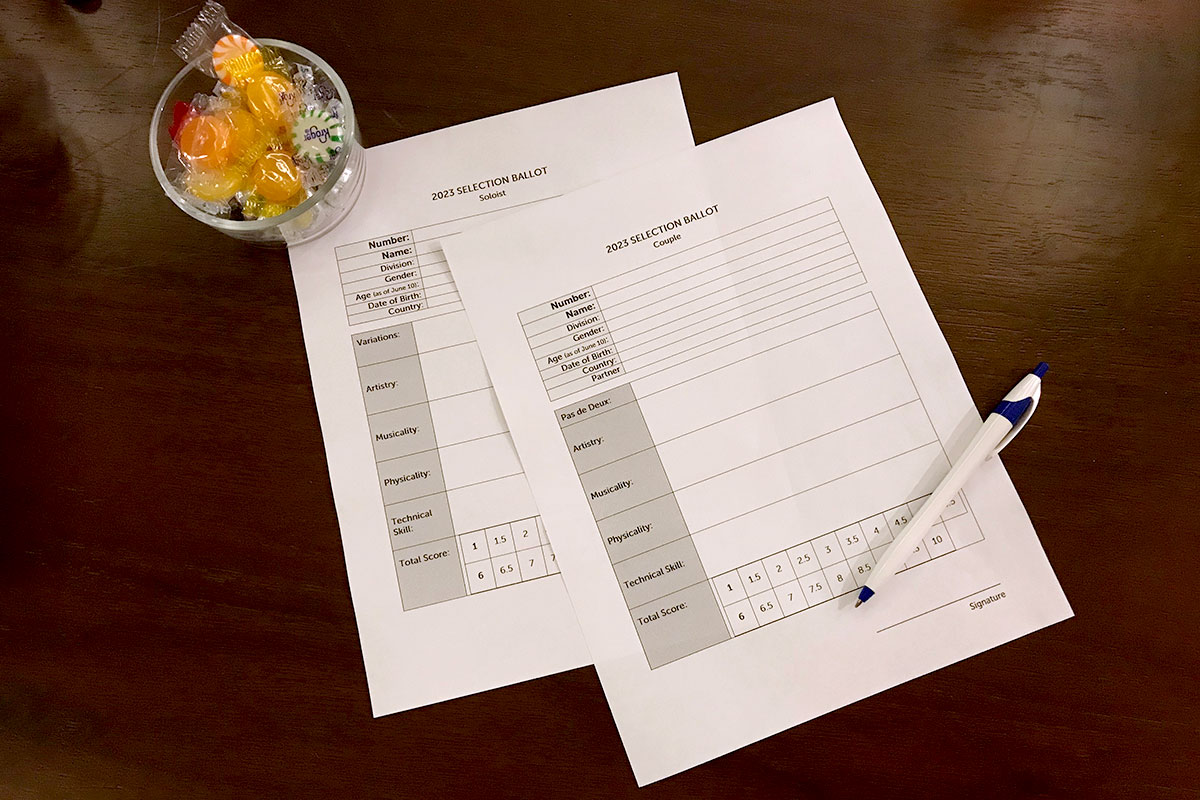JACKSON, Miss.—The room is darkened, voices hushed and the only audio yet another snippet of “Don Quixote” coming from the TV screen across the room. The screen is the focal point for a selection committee of two whose job is to whittle down 340 applicants to about 100 who will receive invitations to compete in the USA International Ballet Competition in Jackson this June.
As a young dancer on screen snaps her fan and steps lively through the showy variation, the duo mumbles their thoughts. Quick scribbles follow. The papers then are brushed into a basket, and it’s on to the next dancer. This late Sunday morning, Joseph Phillips and Ravenna Tucker Wagnon, holed up in the presidential suite of the Westin Jackson, are approaching the final stretch in an early March weekend devoted to reviewing hundreds of video submissions.
“What are we looking for?” Phillips asks, rhetorically. “The best dancer.”
He would know. Among the USA IBC’s best, Phillips took the junior men’s gold in 2002 in Jackson, one of five golds he has earned in international competitions, which is the most of any American dancer. This feat earned him the “golden boy of ballet” nickname in the press.

What they have seen so far, Wagnon says, constitutes “a varied level of talent, from very good to very high technical skill with good artistic quality, to some dancers who are quite young, who are 15, and (whom) we feel could have a little bit more time for training, or maybe have a little bit more coaching on the performance details.”
“I think overall, I’ve been impressed, honestly,” Phillips says. “I wasn’t expecting to be as impressed, just because of the pandemic and … everything that’s been going on.”
“Each division has a few dancers that are quite outstanding,” Wagnon adds.
Selection is part artistic and technical evaluation, part numbers game. Applicants represented 27 countries and were separated into junior (ages 15-18) and senior (ages 19-28) divisions and included 110 junior female dancers, 26 junior male dancers, 128 senior female dancers and 64 senior male dancers.
Dancers can compete as soloists, with a partner who is also a competitor, or with a noncompeting partner. The competition’s two-week time frame—June 10 through June 24—allows for around 100 dancers to proceed through three rounds of competition, successively trimming the field until judges determine medalists and prize winners.
By accepting slightly more than 100 dancers, the USA IBC stands a better chance at hitting its 100-dancer target for the event since, inevitably, a few drop out because of injury, a job offer or other issues.
Jackson hosted its first IBC in 1979. The competition returned to Jackson in 1982, 1986, 1990, 1994, 1998, 2002, 2006, 2010, 2014 and now 2023.

Dancers who have won gold medals or higher at the 2022 Helsinki or Prix de Lausanne international ballet competitions or at the Youth America Grand Prix Finals and meet division requirements may automatically pass the selection process and compete here. Three applicants taking advantage of this policy include 2022 YAGP Finals Grand Prix winner Alexei Orohovsky of Hattiesburg (junior male), 2022 YAGP gold medalist Hibiki Tsukamoto (senior male), 2022 Helsinki gold medalist Keita Fujishima (senior male).
Picking top dancers is the priority, but USA IBC Executive Director and Development Mona Nicholas expresses hope for wide representation from multiple countries. “Because we’re an international competition, we like for that to happen,” she says. “That’s also a good thing for Jackson and a good thing for Mississippi. We want to be able to show off our state and our city.”
Two countries are excluded, however, as of this time. The 2023 USA IBC will neither invite nor allow the participation of Russian or Belarusian dancers and officials, unless the dancers reside in another country and participate under that different country’s flag. The policy supports state resolutions condemning the Russian invasion of Ukraine and the barring of business between state entities and Russia.
Selection committee members use the same ballot that the International Jury does during the competition to score dancers on artistry, musicality, physicality and technical skill. But at the end of the day, “You’re really just looking for overall,” Phillips says. “It’s really all of it. As a professional, you’re looking for professional dancers. You’re looking for people that (make) you say, ‘Hey, I can see them one day in a major company,’ or something like that.”
The process started on the preceding Friday. “In the beginning, it’s a little hard to judge because you want to get a feel for where we’re at,” Wagnon says. “The first dancer you see, you’ve got no standards to go by. … The more you see, you gradually see the range of what’s very good.”
With weather conditions canceling his flights, Phillips arrived late to the process, and Ballet Mississippi Artistic and Executive Director David Keary helped on the front end, keeping selection on track. Keary also stepped in on the few occasions one or the other selector came across a dancer they knew and had to recuse themselves. “It’s a person’s career that is on the line,” Nicholas says, “so it’s very, very important to keep it all fair and accurate.”
Both Phillips and Wagnon come to the job with built-in knowledge of USA IBC workings. In addition to his junior gold in 2002, Phillips danced as the noncompeting partner for senior women’s silver 2014 winner Irina Sapozhnikova and for 2018 senior women’s silver medalist Katherine Barkman. He has returned to perform in galas, and he has twice been the USA IBC torch bearer. Phillips is now ballet master at Westlake School for the Performing Arts in Daly City, Calif., and also resident choreographer for Ballet Philippines in Manila.

Wagnon, a professor of dance at Belhaven University for 16 years who has danced professionally with The Royal Ballet and Birmingham Royal Ballet, was also part of the selection committee for the 2010 IBC, and she was an evaluator in 2014 and again in 2018. “I was just fortunate to be in the community, with the background I’ve had, with some knowledge of ballet,” Wagnon says.
“Selection committee, you have the responsibility of selecting contestants who come,” Wagnon says. “You always feel sorry for the ones that don’t make it, and you try to have as many countries come and give as many opportunities as you can. So, there’s a lot of decision-making.” Evaluators work during the actual competition, watching dancers in competition and picking up on details to share with them about their performances in regard to their musicality, artistry and technique, as well as to pass on judges’ comments.
As a selector, “We think about everything—their age, where they’re from, their potential, the training that we see in the video,” Wagnon says. “So, it’s important to have a good video that’s submitted.”
“I remember making my own video,” Phillips chuckles as he reflects on his own application to compete in Jackson more than two decades prior. “It must’ve been hard before, when you had to put it to VHS!” Now, with today’s digital-sharing options, selectors simply queue videos up from a laptop.

To choose selectors, the USA IBC taps professionals in the field and people who know the IBC, Nicholas says. “I’ve really made an effort to go back to former medalists, because they know the IBC, they love the IBC and they want the best for the IBC,” he explains. “I think it’s going to be great for our competitors to pick their brains.”
“We do also try to have a male and female reviewer for the selection committee, just to help speak to those different categories,” USA IBC Artistic Administrator Sara Berry-Lee says.
Selectors are intimately familiar with the classical repertoire required in video submissions for each division, with “Giselle” and “Flames of Paris” among a host of junior selections, and “Don Quixote” and a different selection from “Giselle” topping the list for seniors.
“It’s tedious. It’s labor intensive, but it’s the most important part, because you have to pick competitors that are at that level that the audience is expecting to see for the IBC,” Nicholas says.
Little bowls of candies help keep the selectors fueled, as does a stack of bacon for Phillips and grapes and berries for Wagnon. Five hours plus on Friday, a fully-stacked Saturday and finishing on Sunday: “It is a marathon,” Nicholas says.
“I was really, really pleased with the number of applicants we got. I think it was the most we’ve ever gotten,” Nicholas says. “We delayed the competition by a year because of that. We wanted people to be ready and to come back and be a strong dancer after having to lay low for a while during the pandemic.”
The delay was “absolutely, without a doubt, the right move,” she adds. “We went to Helsinki (for the International Ballet Competition) this past summer in ’22, and they didn’t have nearly as many applicants as we have.”
At weekend’s end, they had picked 120 dancers from 17 countries. “It was very, very strong,” Nicholas says of the field of applicants, “so, we think it’s going to be a great competition.”
The 2023 USA International Ballet Competition begins on June 10 and continues through June 24, 2023, at Thalia Mara Hall in Jackson—two weeks of competition performances and special programs. Ticket packages are now on sale to International Ballet Association members. All tickets go on sale to the general public on April 3, 2023. For more information on the IBC, visit usaibc.com.










